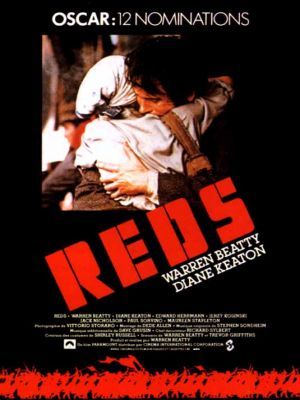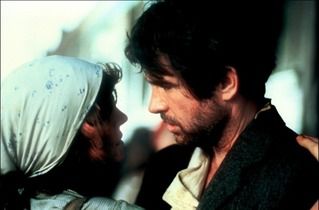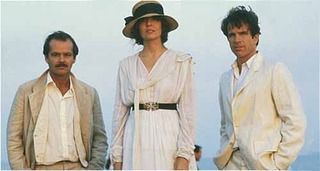
Reds
1981
Director: Warren Beatty
Starring: Warren Beatty, Diane Keaton, lots of others
*heavy sigh* So I watched Reds today. Reds clocks in at 3 hours and 15 minutes.
Here are better uses of my time for those 3 hours and 15 minutes:
1. Roast a 15 lb. turkey
2. Do two loads of laundry
3. Go for a two-hour canal run followed by post-workout snack and shower
4. Clean and organize the linen closet
5. Make mole sauce from scratch
I know, I know, I’m showing my hand too soon about what I thought of the film. Sorry. Can’t help it.
Reds, Beatty’s little pet-slash-vanity project, follows the life of journalist and revolutionary John, nickname Jack, Reed, obviously played by Beatty himself. The film starts when Jack meets Louise Bryant (Keaton), and the two are attracted to one another over shared revolutionary ideals. They get together, fight, break up, get together, fight, break up, then… wait for it… get together, fight, and break up. I think this happened a few more times in the film, but I stopped keeping count. Anyway, for what it’s worth, the background against which they get together, fight, and break up, keeps changing throughout the film. They start getting together, fighting, and breaking up in New York City, then move the bickering and sexy times to Europe then Russia, where both are reporting on the front line of the Russian Revolution, then back to the US, then back to Russia. The film is really focused on Jack Reed, on his transition from journalist reporting on socialist ideals and people’s revolutions, to full-blown revolutionary himself, making the speeches rather than writing about them. (And in between, he gets together, fights, and breaks up with Louise.)
OK, where to start. Well, to the uninitiated, I will reiterate that I. Hate. Epics. If your movie is over three hours – hell, over two and a half – you better have a damned good reason for it to be that long. I have precious little patience for tedious filmmaking. Reds is long. Very very long. To its credit, it managed to keep me engaged for the first hour or so, which, considering I was going in with a bit of a sigh and low expectations, is pretty remarkable. I am being whole-heartedly honest when I say that I give the film props for that first hour. It was a little silly, but I was interested. But the last two-thirds of the movie completely disengaged me. COMPLETELY. I had to start taking breaks every thirty minutes or so to go do some mundane task that was more interesting than watching Warren Beatty yell at Russians. Again. I checked my email continuously. I got caught up on old facebook posts. I got all excited when one of the characters started acting sick, because I knew the end was coming; after all, what would an epic be without someone dying? I literally changed the DVD player over to “countdown” mode so I could revel in the fact that I only had ten minutes left of this nonsense, then I could check this movie off and move on with my life. This is my fundamental problem with epics. You make a movie this long, DO SOMETHING IN IT TO KEEP ME INTERESTED. When I stop caring about a third of the way through, that’s not a good sign.

I found the central relationship rather obnoxious. So did my husband, who was in the same room with me as I slogged my way through Reds. He, though, was smart, and was playing Skyrim in the background. He was so turned off by the two central characters that, to quote him, “I didn’t care, by the end, if they got together or not.” There ya go. He just didn’t care. Frankly, I didn’t either. It’s people like this that I want to slap in the face and yell, “Love isn’t that complicated! What’s the matter with you?!?!” To those overly dramatic types who buy into Shakespeare’s “never run smooth” theory, I feel bad for you. Honestly. Jack and Louise were so tempestuous that any little thing that happened between them resulted in a huge fight that broke them up. Then they got back together. Then they had a huge fight again. I garner no pleasure from watching such a relationship. Even as a young little Siobhan reading Wuthering Heights for the first time in school, I didn’t understand why Heathcliff and Cathy just couldn’t talk things out. Same feelings here. Stop fighting and play nice, folks.
In terms of the politics committed to the screen in this film, here’s where I start to understand why Reds is kind of a big deal. Yeah, it’s impressive that, in 1981, with the Cold War still going on, and Communism definitely a hot-button topic, a sympathetic film was made about a pro-Bolshevik American citizen. That’s ballsy and gutsy and, considering how many other huge actors appeared in this film, this was a high-profile film, meaning there was no place to hide. This wasn’t a tiny little picture, this was big doings. For this reason, I’m sure it was difficult for Beatty to get this movie made, so good for him on seeing the project through. Americans always seem to be scared of the word “communism,” so it’s definitely unique in terms of its subject matter. However, I did not like how the film seemed to whitewash the Russian Revolution. The Russian Revolution is something that frightens me; not in terms of the “people rising up” aspect, but because of the aftermath. It was bloody and violent and scary. None of this is depicted in Reds. All we see is speech-making and cheering crowds, and occasionally, characters talk about hardships in Russia. But we don’t see it. Maybe that was the point, but I felt like the film really undercut just how devastated Russia became.
Alright, let’s talk about Louise. She’s a feminist. But, sigh, and here’s where I turn into crotchety-feminist-Siobhan, you never really see this. Wikipedia had more information about how she was important to feminism causes than Reds. The film marginalizes her work, making it seem like she’s just a little tagalong who is only motivated by her love of Jack Reed. The ending of the movie completely undercuts poor Louise, putting her life’s work only in the context of what Jack Reed did. For me, one of the best parts of the film was when Louise has an affair with playwright Eugene O’Neill, blessedly played by Jack Nicholson. Nicholson is fantastic, his depiction of O’Neill is tremendous, so much so that I sat there, agape, when Louise went running back into Jack Reed’s arms. Really? You had a man who was literally there for you when your lover wasn’t, who told you oh-so-passionately about how much he loves you, and you ditch him for the boring guy? Perhaps it’s just Nicholson’s fault… he’s too good an actor. He acts circles around Beatty, that’s for sure. Diane Keaton was likeable enough as Louise, but I stopped having patience for her character after she ditched Nicholson. Yes, yes, I know it’s based on real life people, to which I will say I did not like these real life people.

The real life people I *did* enjoy were “The Witnesses.” Throughout the movie, we see and hear from people who actually knew Jack Reed and Louise Bryant in real life. These are not actors, these are just regular people. They share little stories and recollections. This was important for me, because it helped to counterbalance the glorification of Jack and Louise in the rest of the film. These people who are interviewed, some of them don’t have the nicest of things to say about Jack and Louise. Some admit to hardly knowing them at all. It was refreshing to not have this be another litany of how wonderful Jack and Louise were. I liked that. Plus it was funny to see a really old guy say, “There was just as much fucking going on back then.”
Look, this whole review really boils down to this not being the film for me. I knew it wasn’t the film for me. I watched it anyway because I’m a glutton for punishment, and I get very OCD about “watch every movie on the list!!!” Good things I got out of this: Jack Nicholson rocks, actual witness accounts were enlightening, and Hollywood had to be pretty damn progressive to make this movie. But no, it has not changed my mind about epics. This was not the epic that made me think I was foolish for disliking the genre. I cheered when the credits rolled, then very happily hit the “Eject” button.
Arbitrary Rating: 4/10
I liked this one more than you did, but I agree with a lot of what you say here. I really liked Diane Keaton in this, though.
ReplyDeleteI'd have been more interested in this film if it had nixed all the crap on the relationships and concerned itself instead with the revolution.
So maybe it should have been two separate films. One is a whiny bohemian arty love story, and the other is a political revolution tale.
DeleteI liked Diane Keaton's performance *she said, thinking carefully about her words*.
Once I start to get even a little annoyed with a movie, I move from "a little annoyed" to "massively annoyed" very very quickly.
By coincidence I saw this for the first time about a week or two ago. I didn't have the problems with the length that you did, but I was the reverse of you in regards to the movie. I didn't care all that much about the early part of the film. I found it okay, but not that interesting. I could have done without the whole Eugene O'neill subplot. It just felt like the movie was spinning its wheels there and giving another excuse to cause a problem in the relationship. It was the Russian scenes that kept my interest up.
ReplyDeleteI was also surprised that Stapleton's character was in so little of the movie because I knew she had won a Best Supporting Actress Oscar.
I saw Reds not just because it's on the 1,001 list, but also because it was a Best Picture nominee. I've now got Best Picture nominee Tess - all 3 hours of it - sitting on my coffee table and I don't have much urge to see it.
Yeah, most people I've talked to about this movie have enjoyed the Russian Yelling two hours of the film more than I did, but whatevs. I still think it's an incongruous film, and the two sections should have been separated from each other.
DeleteI remember reading that Stapleton won, and I was all, "for THIS?" It's like Judi Dench winning for Shakespeare in Love!
You have fun with Tess. I shall not join you.